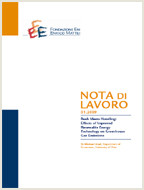The Effects of Expert Selection, Elicitation Design, and R&D Assumptions on Experts’ Estimates of the Future Costs of Photovoltaics

Data
20.01.2015
20.01.2015
Autori
Elena Verdolini (Fondazione Eni Enrico Mattei, Centro-Euro Mediterraneo sui Cambiamenti Climatici); Laura Diaz Anadon (John F. Kennedy School of Government – Harvard University); Jiaqi Lu (La Follette School of Public Affair – University of Wisconsin-Madison); Gregory F. Nemet (La Follette School of Public Affair – University of Wisconsin-Madison, Nelson Institute Center for Sustainability and the Global Environment SAGE – La Follette School of Public Affair)
Codice JEL
O32, Q40, Q55
O32, Q40, Q55
Parole chiave:
Photovoltaic Costs, Energy R&D, Expert Elicitation, Survey Design, Heuristics
Photovoltaic Costs, Energy R&D, Expert Elicitation, Survey Design, Heuristics
Publisher
Energy: Resources and Markets
Energy: Resources and Markets
Editor
Giuseppe Sammarco
Giuseppe Sammarco
Expert elicitations of future energy technology costs can improve energy policy design by explicitly characterizing uncertainty. However, the recent proliferation of expert elicitation studies raises questions about the reliability and comparability of the results. In this paper, we standardize disparate expert elicitation data from five EU and US studies, involving 65 experts, of the future costs of photovoltaics (PV) and evaluate the impact of expert and study characteristics on the elicited metrics. The results for PV suggest that in-person elicitations are associated with more optimistic 2030 PV cost estimates and in some models with a larger range of uncertainty than online elicitations. Unlike in previous results on nuclear power, expert affiliation type and nationality do not affect central estimates. Some specifications suggest that EU experts are more optimistic about breakthroughs, but they are also less confident in that they provide larger ranges of estimates than do US experts. Higher R&D investment is associated with lower future costs. Rather than increasing confidence, high R&D increases uncertainty about future costs, mainly because it improves the base case (low cost) outcomes more than it improves the worst case (high cost) outcomes.
***
Suggested citation: Elena Verdolini, Laura Diaz Anadon, Jiaqi Lu, Gregory F. Nemet, The effects of expert selection, elicitation design, and R&D assumptions on experts’ estimates of the future costs of photovoltaics, Energy Policy, Volume 80, May 2015, Pages 233-243, ISSN 0301-4215, http://dx.doi.org/10.1016/j.enpol.2015.01.006
.
